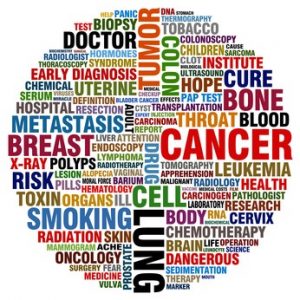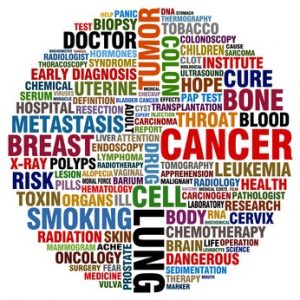Why Are Vitamin D Studies So Confusing?
Author: Dr. Stephen Chaney
Does vitamin D supplementation reduce cancer deaths?
 When I was in graduate school (which was just a few decades ago), vitamin D was thought to be important for healthy bones and teeth, and that was about it. Its role in calcium metabolism was well established, but we knew little else about its role(s) in the body. In fact, we were taught we knew all we needed to know about vitamin D.
When I was in graduate school (which was just a few decades ago), vitamin D was thought to be important for healthy bones and teeth, and that was about it. Its role in calcium metabolism was well established, but we knew little else about its role(s) in the body. In fact, we were taught we knew all we needed to know about vitamin D.
Shortly after I graduated, it was discovered that almost every cell in our body had vitamin D receptors, and vitamin D research exploded. A few years ago, vitamin D appeared to be almost magic. Studies suggested that it:
- Strengthened the immune system.
- Prevented autoimmune diseases like type 1 diabetes and multiple sclerosis.
- Reduced the risk of cancer and heart disease.
- Helped regulate insulin levels and aided in type 2 diabetes management.
- Supported the health of our lungs, brain, and nervous system.
Those were the headlines that you saw in the news and still see in Dr. Strangelove’s health blogs.
However, when these early studies were followed by a series of double-blind, placebo controlled clinical trials, the only benefit that was consistently validated was the strengthening of our immune system.
That has led to a series of headlines and posts in medical blogs saying things like: “Vitamin D supplements are worthless” and “You should stop taking your vitamin D supplements.”
“What is a person to believe? Why is it so confusing?”
In this week’s issue of “Health Tips From the Professor” I discuss a recent study confirming that vitamin D reduces cancer deaths. But before I do that, I will cover what I call “Vitamin D Metabolism 101” to put this week’s topic into context. Later in the article, I will discuss why vitamin D studies are so confusing.
Vitamin D Metabolism 101
There are two things you need to know about vitamin D metabolism to understand today’s article:
 Vitamin D occurs in two forms, D3 and D2. Vitamin D3 is the form of vitamin D that our body makes when sunlight hits our skin. Vitamin D2 is a structurally similar analog derived from yeast. For years we thought that vitamin D3 and D2 were equivalent. Vitamin D2 was less expensive, so it was one most often used in supplements.
Vitamin D occurs in two forms, D3 and D2. Vitamin D3 is the form of vitamin D that our body makes when sunlight hits our skin. Vitamin D2 is a structurally similar analog derived from yeast. For years we thought that vitamin D3 and D2 were equivalent. Vitamin D2 was less expensive, so it was one most often used in supplements.- Vitamin D is inactive. It needs to be activated by the body. It is first converted to 25-hydroxyvitamin D, which is the most abundant form of vitamin D in the bloodstream. It is then taken up by our cells and converted to 1,25-dihydroxyvitamin D, which is the active form. There are two things you need to know about this.
- Since 25-hydroxyvitamin D is found in the blood, it is used as a marker to determine the vitamin D status in the body.
- Recent studies suggest that vitamin D3 is more readily activated than vitamin D2, so it has become the preferred choice for supplementation. The result of this recent conversion from D2 to D3 means that older studies on vitamin D supplementation were primarily done with D2 while newer studies were primarily done with D3.
How Was The Study Done?
 This study (Y Zhang et al, BMJ, 366:I4673, 2019 ) was a meta-analysis of 52 clinical trials with 75,454 participants looking at the relationship between vitamin D supplementation cancer deaths, heart disease deaths, and deaths due to any cause.
This study (Y Zhang et al, BMJ, 366:I4673, 2019 ) was a meta-analysis of 52 clinical trials with 75,454 participants looking at the relationship between vitamin D supplementation cancer deaths, heart disease deaths, and deaths due to any cause.
All the clinical trials were intervention studies in which vitamin D supplementation was compared to either a placebo or no treatment. All participants were adults over the age of 18 and without any pre-existing health conditions. The meta-analysis excluded studies if:
- Any participants had pre-existing health conditions.
- Any participants were pregnant or lactating women.
- Calcium was included along with vitamin D unless both the treatment and placebo groups were given the same amount of calcium.
Does Vitamin D Supplementation Reduce Cancer Deaths?
The results of the study were:
 Vitamin D supplementation reduced cancer deaths by 16%. This difference was statistically significant. And:
Vitamin D supplementation reduced cancer deaths by 16%. This difference was statistically significant. And:
- This effect was only seen with vitamin D3 supplementation, not with vitamin D2 supplementation.
- The reduction in cancer deaths by vitamin D was only seen in clinical trials that lasted more than 3 years but was not seen in shorter clinical trials.
- Vitamin D supplementation did not reduce heart disease deaths. However:
- Weaknesses in the clinical trials included in this meta-analysis made it virtually impossible to determine whether vitamin D supplementation influenced heart disease deaths or not.
- Vitamin D supplementation did not significantly reduce death from all causes. However:
- Death from all causes was significantly less in studies using vitamin D3 than in studies in studies using vitamin D2.
- Death from all causes was significantly lower in clinical trials with a longer duration.
Why Are Vitamin D Studies So Confusing?
 [Note: This section is a bit technical, so if you aren’t really interested in why vitamin D studies are confusing, you can just skip this section.]
[Note: This section is a bit technical, so if you aren’t really interested in why vitamin D studies are confusing, you can just skip this section.]
To understand why vitamin D studies are so confusing, it is important to look at vitamin D research from a historical perspective.
Vitamin D research, like most nutrition research, starts with association studies. Association studies have suggested that vitamin D deficiency significantly increases the risk of heart disease and cancer and slightly increased the risk of death from any cause. However, association studies have their strengths and weaknesses. For example:
Strengths:
- Association studies can follow large groups of people for a long time.
- Association studies are particularly good at identifying the long-term effects of nutritional patterns (such as vitamin D deficiency) on health outcomes.
Weaknesses:
- Association studies cannot prove cause and effect, so they are usually followed by intervention studies, such as the ones included in this meta-analysis.
However, intervention studies and this meta-analysis also have their own strengths and weaknesses.
Strengths: The strengths of this meta-analysis are the sample size (52 clinical trials, 75,454 participants) and the rigorous criteria for inclusion of studies in the meta-analysis.
Weaknesses: There are three kinds of weaknesses associated with this study.
- Weaknesses of Meta-Analysis Studies: A meta-analysis increases statistical power by combining multiple studies. However, these studies do have weaknesses. For example:
-
- The strength of the meta-analysis is only as good as the strength of the individual studies that go into it. This is the “garbage in – garbage out” phenomenon.
-
- The individual studies use different amounts of vitamin D for different lengths of time. So, this meta-analysis is unable to tell you how much supplemental vitamin D would be required to lower your cancer risk.
- Weaknesses of Intervention Studies: Double-blind, placebo-controlled intervention studies are considered the “gold standard” for evidence-based medicine. However, they also have their own weaknesses.
-
 They are usually small. This limits their statistical power to see small effects.
They are usually small. This limits their statistical power to see small effects.- They are usually short.
- This is a problem for studies looking at disease outcomes because most major diseases like heart disease or cancer develop over decades. Intervention studies like the ones included in this meta-analysis are simply too short to determine whether vitamin D supplementation could prevent those diseases.
- It is also a problem for heart disease deaths because they often occur a decade or more after diagnosis. Thus, it is not surprising that the intervention studies included in this meta-analysis have failed to confirm an association between vitamin D and heart disease deaths.
- However, most cancer deaths occur within the first 2-5 years after diagnosis. So, it is not surprising that intervention studies lasting 3 years or more have been able to confirm an association between vitamin D and cancer deaths.
- Weaknesses of Studies With Popular Supplements: Once the benefits of certain nutrients show up in the headlines, people start taking those supplements. This has become a big problem for studies with vitamin D and omega-3 fatty acids. For example:
- > 75% of Americans take a multivitamin with vitamin D, and an additional 18% of adults over 50 also take a vitamin D supplement.
- In this meta-analysis more than half of the participants had a baseline 25-hydroxyvitamin D level of > 50 nmol/L, which the NIH considers to be adequate, prior to supplementation.
- That means most of these studies were not asking whether correcting a vitamin D deficiency reduced the risk of death. They were asking whether giving a vitamin D supplement to someone whose vitamin D status was already adequate had any additional benefit. In this context:
- Previous association studies have suggested that a 25-hydroxyvitamin D level of 50 nmol/L is enough to reduce heart disease deaths. Since most of the participants in the clinical trials included in this study started with this level prior to supplementation, it is not surprising that this study found no benefit of vitamin D supplementation on heart disease deaths.
- However, previous association studies have suggested that a 25-hydroxyvitamin D level of 75 nmol/L or greater is required to reduce cancer deaths. Thus, it is not surprising that this and other studies have been able to show that vitamin D supplementation reduces cancer deaths.
In short, these weaknesses in intervention studies have made it virtually impossible to determine whether vitamin D supplementation influences heart disease deaths. Unfortunately, a meta-analysis like this one is only as good as the intervention studies that go into it. This is the “garbage in – garbage out” phenomenon.
However, those weaknesses did not apply to cancer deaths. This and other studies make a strong case that vitamin D supplementation does reduce cancer deaths.
What Does This Study Mean For You?
 Association studies have suggested that vitamin D deficiency significantly increases the risk of heart disease and cancer and slightly increased the risk of death from any cause.
Association studies have suggested that vitamin D deficiency significantly increases the risk of heart disease and cancer and slightly increased the risk of death from any cause.
- This study confirms vitamin D supplementation significantly decreases cancer deaths as predicted from association studies. This observation is strengthened by two other major clinical studies in recent months that have come to the same conclusion. I reported on one of them in a recent issue of “Health Tips From The Professor.”
- This study does not indicate an optimal dosage, but the recent VITAL study) reported that 2,000 IU of vitamin D/day was effective at reducing the risk of cancer deaths.
- The authors of this study concluded that vitamin D supplementation has no effect on heart disease deaths. However:
- It would be more accurate to say that weaknesses in the design of the intervention trials included in their study made it virtually impossible to determine whether vitamin D supplementation influenced heart disease deaths.
- To adequately assess whether vitamin D reduced heart disease deaths one would need to start with a population that was deficient in vitamin D and supplement with vitamin D for 5 years or more. That kind of study has not been performed.
- The data on whether vitamin D reduces the risk of dying from any cause is less clear.
- This study reported that vitamin D supplementation decreased the risk of death from any cause by a non-significant 2%.
- Two other recent meta-analyses reported that vitamin D supplementation did have a significant effect on the risk of dying from any cause. However, the risk reduction was 3% in one study and 4% in the other study.
- Clearly, vitamin D supplementation is not going to help you live to 100.
The Bottom Line
Previous association studies have suggested that vitamin D deficiency significantly increases the risk of heart disease and cancer and slightly increased the risk of death from any cause.
A recent meta-analysis of 52 clinical trials with 75,454 participants tested those predictions by looking at the effect of vitamin D supplementation on cancer deaths, heart disease deaths, and deaths due to any cause. All the clinical trials were intervention studies in which vitamin D supplementation was compared to either a placebo or no treatment. All participants were adults over the age of 18 and without any pre-existing health conditions.
The results of this meta-analysis were:
- Vitamin D supplementation reduced cancer deaths by 16%. This difference was statistically significant. And:
- This effect was only seen with vitamin D3 supplementation, not with vitamin D2 supplementation.
- The effect of vitamin D supplementation on cancer deaths is strengthened by two other major clinical studies in recent months that have come to the same conclusion.
- This study did not indicate an optimal dosage, but the recent VITAL study reported that 2,000 IU of vitamin D/day was effective at reducing the risk of cancer deaths.
- Vitamin D supplementation did not reduce heart disease deaths. However:
- Weaknesses in the clinical trials included in this meta-analysis made it virtually impossible to determine whether vitamin D supplementation influenced heart disease deaths or not.
- Vitamin D supplementation did not significantly reduce death from all causes. However:
- Death from all causes was significantly less in studies using vitamin D3 than in studies using vitamin D2.
- Death from all causes was significantly lower in clinical trials with a longer duration.
For more details on the study and what it means for you, read the article above. Also, if you would like to understand why there is so much confusion about vitamin D’s health benefits, it is also discussed in the article above.
These statements have not been evaluated by the Food and Drug Administration. This information is not intended to diagnose, treat, cure or prevent any disease.










